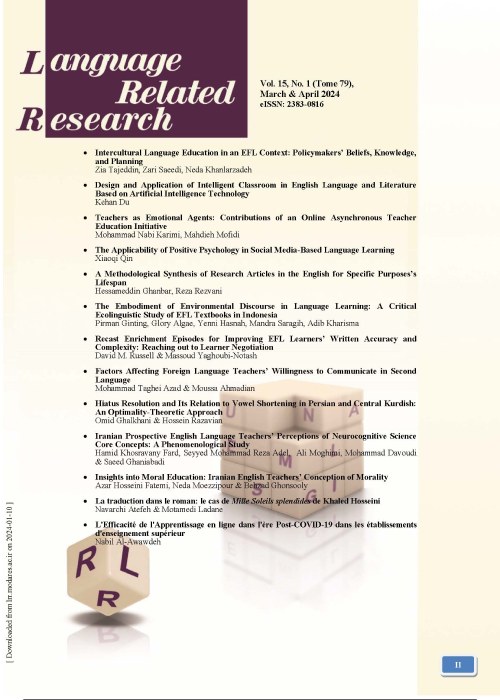ocio-cognitive Analysis of Taboo and Euphemism in Expressions, Idioms and Proverbs Structures, of Persian and English
Author(s):
Abstract:
In this research, taboo and euphemism are examined with a socio-cognitive perspective. The study is conducted on the structures of expressions in Persian and English and 15 pairs (30 items) of these terms are compared and contrasted. Social topics such as social variables, taboo and euphemism, cognitive subjects including schema applications, and metaphors are included in this investigation. The main purpose is to clarify the similarities and differences existing in the two languages. Data are analyzed analytically and descriptively. The results show that the terms that contain taboo, are converted to other terms that have a kind of euphemism, so they are euphemized in order to be accepted in the society. The data is part of the most commonly used idioms and proverbs used in Persian and English. We collected the data from the documentary, library, electronic sources like internet, and also used the related books in relation to the types of idioms and proverbs in two languages. The research hypothesis is that although in the surface structure and objective representation of the two-languages, speakers have differences in the use of taboo and euphemism, but in the underlying structure of the languages, there are very similar concepts based on cognitive-socio elements of language. These concepts are coded through metaphors in the minds of the speakers. In this study, we will answer the following question: Based on which schemas taboo and euphemism are formed in the minds of the speakers in these two languages? And what are social aspects of these two issues? Variables of style, gender, age, occupation, social class and power; as well as force, event, object and possession schemas have been mostly used in the structures of expressions. Sometimes people look at the subject from one point of view; sometimes this point of view involves several topics. Based on the subject in their mind, an expression that has the right schema is selected. The expressions in both languages have the same semantic underlying structure and subject, but in the surface structure, the objective representation and the structure of each item are different. In fact, every term has a kind of conceptual metaphor in its structure that forms a kind of connection between the underlying structure of that term in terms of its semantic and its surface structure, in terms of constituent words. Therefore, the concept and subject are the same, but the ways to deal with these concepts are different. As mentioned, most of the schemas used to create these terms are force (or power), event, object and possession schemas. Volumetric, motor and surface schemas are used at lower levels. Meanwhile, the types of application and structures used in taboo and euphemisms depend on the positioning of individuals based on the principles of politeness, which points to the link between social and cognitive foundations. In sum, the study of the collection of these elements, with a cognitive-socio approach, in relation to taboo and euphemisms, in English and Persian is a systematic and new study that we investigated in this research in details.
Keywords:
Language:
Persian
Published:
Language Related Research, Volume:9 Issue: 6, 2019
Pages:
317 to 334
magiran.com/p1923301
دانلود و مطالعه متن این مقاله با یکی از روشهای زیر امکان پذیر است:
اشتراک شخصی
با عضویت و پرداخت آنلاین حق اشتراک یکساله به مبلغ 1,390,000ريال میتوانید 70 عنوان مطلب دانلود کنید!
اشتراک سازمانی
به کتابخانه دانشگاه یا محل کار خود پیشنهاد کنید تا اشتراک سازمانی این پایگاه را برای دسترسی نامحدود همه کاربران به متن مطالب تهیه نمایند!
توجه!
- حق عضویت دریافتی صرف حمایت از نشریات عضو و نگهداری، تکمیل و توسعه مگیران میشود.
- پرداخت حق اشتراک و دانلود مقالات اجازه بازنشر آن در سایر رسانههای چاپی و دیجیتال را به کاربر نمیدهد.
دسترسی سراسری کاربران دانشگاه پیام نور!
اعضای هیئت علمی و دانشجویان دانشگاه پیام نور در سراسر کشور، در صورت ثبت نام با ایمیل دانشگاهی، تا پایان فروردین ماه 1403 به مقالات سایت دسترسی خواهند داشت!
In order to view content subscription is required
Personal subscription
Subscribe magiran.com for 70 € euros via PayPal and download 70 articles during a year.
Organization subscription
Please contact us to subscribe your university or library for unlimited access!



